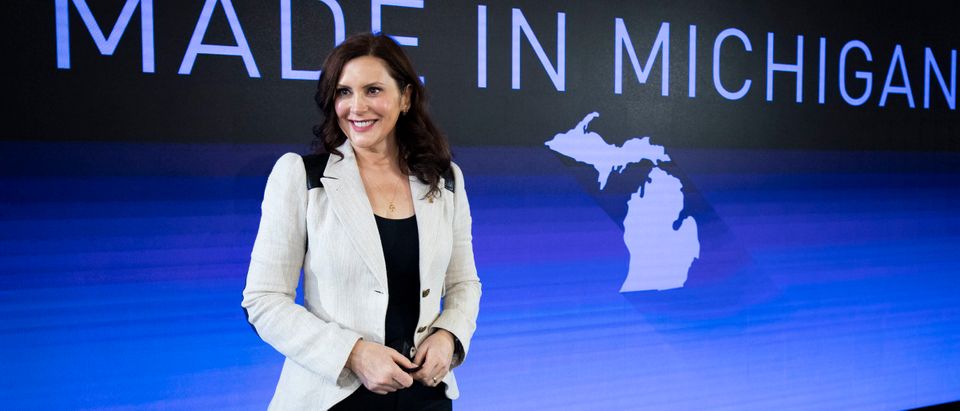Democratic Michigan Governor Gretchen Whitmer spent mid-January on a European trade mission, participating in a panel discussion at the World Economic Forum on the “Return of Manufacturing.” Back home in the Great Lakes State, her legislative allies were launching with her tacit approval a national effort to drive off manufacturing jobs – and the blue-collar men and women who work them – far, far away.
Just days before, local Democrats made a statewide media push touting their biggest legislative priority – a repeal of the state’s immensely popular right-to-work law.
It’s the opening salvo in what political experts believe will be a protracted war against well-liked, pro-worker reforms, intended to prop up union war chests that have taken a hit as workers have abandoned them in droves in recent decades.
Right-to-work laws ensure a worker cannot be fired for refusing to pay dues to a labor union. Workers love the additional rights, freedoms, and protections. Unions that count on mandatory dues payment to fund their operations detest the basic accountability that comes with having to earn workers’ membership.
An early, consistent, and key ally of President Joe Biden, with rumored aspirations beyond her home state, Whitmer finds herself weighing competing interests – the success and prosperity of hardworking Michiganders or the backing of powerful, partisan, and well-moneyed union executives so critical to the Democratic Party’s primary politics.
If she’s interested in what really benefits workers’ families, the choice couldn’t be clearer.
Enacted a little over 10 years ago in Michigan, right-to-work reforms have been a resounding and unqualified success.
Average unemployment in Michigan during the 10 years before right-to-work was 8.5%. In the decade since, it dropped to 6%, according to the Bureau of Labor Statistics (BLS). That improvement is even more staggering when one considers the 10 years after right-to-work included massive unemployment spikes during the height of the coronavirus pandemic.
In the nine years before the reform, BLS reports the state’s labor force declined by over 350,000 workers. That labor force went up more than 90,000 after the reform. Nationally, right-to-work states have seen employment growth more than double the rate of states that mandate union membership as a condition of employment.
They’ve also seen nearly a million people moving within the United States, away from states that force union membership in just the last 2 years.
State revenue declined in Michigan by nearly 18% during the 10 years before the change. It’s gone up 15.3% in the decade after as the economy has improved.
More importantly, everyday working families have seen their own income grow. Inflation-adjusted average income grew just 0.6% in the years before the state protected workers’ rights. In a reversal that all but defies the imagination, it’s gone up 21.9% in the years since.
One number Governor Whitmer may have found particularly interesting while preparing for her discussion at Davos: growth of manufacturing employment in right-to-work states like Michigan was well over 9% between 2011 and 2021. It was -0.5% in non-right-to-work states.
Manufacturers are creating many thousands of jobs, and they’re choosing to create them in states where workers are empowered to make their own choices about union membership.
It should come as no surprise, then, that voters consistently and overwhelmingly prefer workplace freedom. In Michigan, January polling shows voters back the state’s right-to-work law by a 2-to-1 margin. More Democrats and left-leaning Independents support it than don’t. More of Governor Whitmer’s own voters support it than don’t. Even union members – the people labor leaders who oppose right-to-work claim to represent – support it nearly 2-to-1.
Freedom appeals to everybody, even traditional working-class Democrats who could determine the state’s elections – and the future of politicians like Joe Biden and Gretchen Whitmer in 2024.
Democratic politicians are struggling still to let go of the past.
There’s a tendency in certain circles to assume the way an issue impacts voters today is the same as it’s impacted them in the past – a sort of political petrification. The fossil record certainly exists on this issue. Workplace freedom was for decades a political impossibility in many states, including Michigan, and a political death sentence for the careers of elected officials who dared broach the subject.
Then things changed, the sun rose the next morning, voters overwhelmingly re-elected reformers, and they learned their paychecks were bigger, job options more plentiful, and the standard of living improved.
President Biden and allies like Whitmer dwell still with the fossil record. Democrats in Congress voted twice in recent years to ban all state right-to-work laws. The Biden administration actively undermines workplace rights through the Department of Labor and the National Labor Relations Board.
Now, after the multi-year UAW corruption investigation that saw the conviction of 2 former union presidents and a host of other union officials, Michigan Democrats want to strip away a worker’s ability to hold their union answerable and accountable; in essence to legislate away a worker’s power and give it back to the holders of the union’s purse strings.
But the culture has adapted. It’s changed. Compulsion is no longer an acceptable union business model. Their own voters like the extra cash and additional freedom. They’ve very much enjoyed the local return of manufacturing. Biden, Whitmer, and their political allies should take heed. Come to think of it, that’d make a fantastic panel discussion in Davos.
Akash Chougule is Vice President of Americans for Prosperity. Terry Bowman is Board Chair at the Institute for the American Worker and formerly a 26-year Ford/UAW worker.
The views and opinions expressed in this commentary are those of the author and do not reflect the official position of the Daily Caller.


